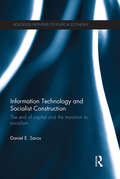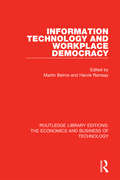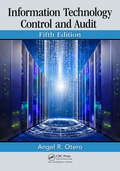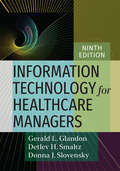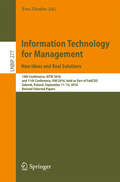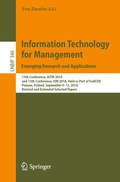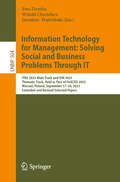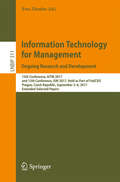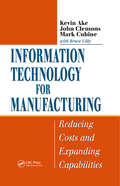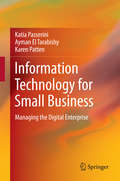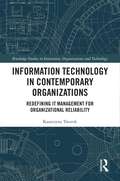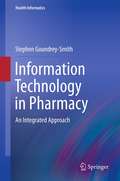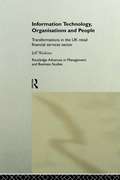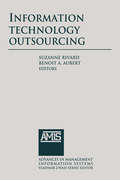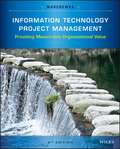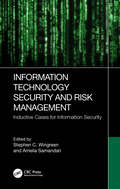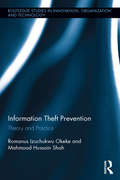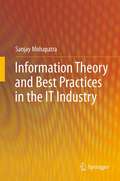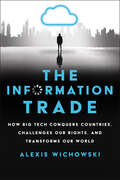- Table View
- List View
Information Technology and Socialist Construction: The End of Capital and the Transition to Socialism (Routledge Frontiers of Political Economy #184)
by Daniel E. SarosThe failure of command central planning in the twentieth century has led to a general disillusionment within the socialist movement worldwide. Some alternatives to capitalism have been proposed since the end of the Cold War, but none has offered an alternative form of economic calculation. This book explains how modern information technology may be used to implement a new method of economic calculation that could bring an end to capitalism and make socialism possible. In this book, the author critically examines a number of socialist proposals that have been put forward since the end of the Cold War. It is shown that although these proposals have many merits, their inability effectively to incorporate the benefits of information technology into their models has limited their ability to solve the problem of socialist construction. The final section of the book proposes an entirely new model of socialist development, based on a "needs profile" that makes it possible to convert the needs of large numbers of people into data that can be used as a guide for resource allocation. This analysis makes it possible to rethink and carefully specify the conditions necessary for the abolition of capital and consequently the requirements for socialist revolution and, ultimately, communist society. Information Technology and Socialist Construction will be of interest to students and scholars of political economy, the history of economic thought, labour economics and industrial economics.
Information Technology and the U.S. Workforce: Where Are We and Where Do We Go from Here?
by National Academies of Sciences Engineering MedicineRecent years have yielded significant advances in computing and communication technologies, with profound impacts on society. Technology is transforming the way we work, play, and interact with others. From these technological capabilities, new industries, organizational forms, and business models are emerging. Technological advances can create enormous economic and other benefits, but can also lead to significant changes for workers. IT and automation can change the way work is conducted, by augmenting or replacing workers in specific tasks. This can shift the demand for some types of human labor, eliminating some jobs and creating new ones. Information Technology and the U.S. Workforce explores the interactions between technological, economic, and societal trends and identifies possible near-term developments for work. This report emphasizes the need to understand and track these trends and develop strategies to inform, prepare for, and respond to changes in the labor market. It offers evaluations of what is known, notes open questions to be addressed, and identifies promising research pathways moving forward.
Information Technology and Workplace Democracy (Routledge Library Editions: The Economics and Business of Technology #6)
by Martin Beirne Harvie RamsayThe revolution in new technology gave rise to new work patterns and improved productivity, all of which affect the management of human resources. Expectations for increased efficiency have not always been fulfilled because of the problems that have arisen in workings of labour relations. How can management maximize the benefits of these technologies while co-operating with their employees? How far are trade unions involved in the decisions as companies adopt new technology? Is the workforce consulted in systems design? This book, originally published in 1992 looks at the problems of developing strategies in information technology when considering labour relations. Experts in industrial sociology, human resource management and organizational behaviour assess the achievements and failures, including consideration of issues such as public sector work, gender and race. Drawing on empirical evidence, the contributors cover a wide range of industries including case studies in electronics and banking, together with international comparisons.
Information Technology at COSCO
by Chen Guoqing F. Warren Mcfarlan David LaneDescribes the current status of IT applications at the second largest container shipping company in the world: China-based COSCO. Describes the challenges the company has faced in dealing with its development and shows a series of organizational and application challenges it must select from in the future. Shows the growing IT sophistication of large, state-owned enterprises in China.
Information Technology Control and Audit, Fifth Edition
by Angel R. OteroThe new fifth edition of Information Technology Control and Audit has been significantly revised to include a comprehensive overview of the IT environment, including revolutionizing technologies, legislation, audit process, governance, strategy, and outsourcing, among others. This new edition also outlines common IT audit risks, procedures, and involvement associated with major IT audit areas. It further provides cases featuring practical IT audit scenarios, as well as sample documentation to design and perform actual IT audit work. Filled with up-to-date audit concepts, tools, techniques, and references for further reading, this revised edition promotes the mastery of concepts, as well as the effective implementation and assessment of IT controls by organizations and auditors.
Information Technology for Healthcare Managers, Ninth edition
by Gerald L. Glandon Donna J. Slovensky Detlev H. SmaltzThough healthcare is largely technology driven, the deployment of health information technology (HIT) has occurred in waves rather than a steady flow, and usually in response to government mandates. This emergent HIT strategy has culminated in highly complex and dynamic systems crafted over many years using products from multiple vendors. Healthcare organizations are now focused on big data aggregated from myriad data-producing applications both in and beyond the enterprise. Healthcare leaders must position themselves to leverage the new opportunities that arise from HIT's ascendance and to mine the vast amount of available data for competitive advantage. Where can they turn for insight? With the unique advantage of both academic and real-world experience in HIT leadership, the authors of Information Technology for Healthcare Managers blend management theory, cutting-edge tech knowledge, and a thorough grounding in the healthcare applications of technology. Opinions abound on technology's best uses for society, but healthcare organizations need more than opinion—they need knowledge and strategy. This book will help leaders combine tech savvy with business savvy for sustainable success in a dynamic environment.
Information Technology for Management: New Ideas and Real Solutions
by Ewa ZiembaThis book constitutes revised selected papers from the 14th Conference on Advanced Information Technologies for Management, AITM 2016, and the 11th Conference on Information Systems Management, ISM 2016, held as part of the Federated Conference on Computer Science and Information Systems, FedCSIS, which took place in Gdansk, Poland, in September 2016. The 13 papers presented in this volume were carefully reviewed and selected from 51 submissions. They were organized in topical sections named: information technology and systems for knowledge management; information technology and systems for business transformation; and implementation and evaluation of information systems.
Information Technology for Management: 15th Conference, AITM 2018, and 13th Conference, ISM 2018, Held as Part of FedCSIS, Poznan, Poland, September 9–12, 2018, Revised and Extended Selected Papers (Lecture Notes in Business Information Processing #346)
by Ewa ZiembaThis book constitutes extended selected papers from the 16th Conference on Advanced Information Technologies for Management, AITM 2018, and the 13th Conference on Information Systems Management, ISM 2018, held as part of the Federated Conference on Computer Science and Information Systems, FedCSIS, which took place in Poznan, Poland, in September 2018. The total of 9 full and 3 short papers presented in this volume were carefully reviewed and selected from a total of 43 submissions. The papers selected to be included in this book contribute to the understanding of relevant trends of current research on information technology for management in business and public organizations. They were organized in topical sections named: information technology and systems for knowledge management, and information technology and systems for business transformation.
Information Technology for Management: ITBS 2023 Main Track and ISM 2023 Thematic Track, Held as Part of FedCSIS 2023, Warsaw, Poland, September 17–20, 2023, Extended and Revised Selected Papers (Lecture Notes in Business Information Processing #504)
by Ewa Ziemba Witold Chmielarz Jarosław WątróbskiThe present book includes extended and revised versions of a set of selected papers submitted to the Topical Area of Information Technology for Business and Society, ITBS 2023, and two Thematic Tracks: Information System Management, ISM 2023, and Knowledge Acquisition and Management, KAM 2023, held in Poland, Warsaw, during September 17- 20, 2023. ITBS 2023 received 26 submissions, from which 6 full papers and 2 short papers have been accepted; for ISM 2023 3 full papers and 1 short paper have been accepted from 21 submissions; and for KAM 2023 1 full paper has been accepted from 7 submissions. From the 6 submissions to DSH 2023, no paper passed the extended reviews. The accepted papers are grouped in sections on IT in Improving of Management Systems, Approaches to Improving of Social Problems, and Methods of Solving Business.
Information Technology for Management. Ongoing Research and Development: 15th Conference, Aitm 2017, And 12th Conference, Ism 2017, Held As Part Of Fedcsis, Prague, Czech Republic, September 3-6, 2017, Extended Selected Papers (Lecture Notes In Business Information Processing #311)
by Ewa ZiembaThis book constitutes extended selected papers from the 15th Conference on Advanced Information Technologies for Management, AITM 2017, and the 12th Conference on Information Systems Management, ISM 2017, held as part of the Federated Conference on Computer Science and Information Systems, FedCSIS, which took place in Prague, Poland, in September 2017. The 13 papers presented in this volume were carefully reviewed and selected from 48 submissions. They were organized in topical sections named: information technology and systems for knowledge management; information technology and systems for business transformation; and implementation and evaluation of information systems.
Information Technology for Manufacturing: Reducing Costs and Expanding Capabilities
by Kevin Ake John Clemons Mark Cubine Bruce LillyThe rate of change in manufacturing today is faster than ever. Retailers and consumers demand flexibility and responsiveness, regulatory oversight is on the rise, and increasing consolidations require companies to demonstrate cost and efficiency improvements. Information Technology for Manufacturing describes how IT can help manufacturers e
Information Technology for Small Business
by Ayman El Tarabishy Karen Patten Katia PasseriniInformation Technology for Small Business: Managing the Digital Enterprise provides an overview of how small and medium business enterprises (SMEs) can use flexibility, agility, and anticipation strategies to better utilize information technology and knowledge management. Because small and medium businesses tend to be late technology adopters, they could miss versatile and strategic workforce advantages that enable them to achieve higher efficiency and effectiveness through technology. This book shows these SMEs new technology trends that can transform the nature of their operations both in an evolutionary business path and through revolutionary opportunities. Information Technology for Small Business: Managing the Digital Enterprise applied correctly to small and medium business can be used as a strategic tool to reach growth and profit goals for the SMEs competing in a very dynamic and global marketplace. Examples include: identifying ways that IT can be used to develop strong relationships with customers and suppliers, and how to select the best technologies for business needs. Information Technology for Small Business: Managing the Digital Enterprise targets SME owners, educators, and practitioners working in the related fields of management, IT, IS, and CS-related disciplines. Advanced-level students and policy makers focusing on SMEs will also find this book valuable in terms of main concepts for discussion.
Information Technology in Contemporary Organizations: Redefining IT Management for Organizational Reliability (Routledge Studies in Innovation, Organizations and Technology)
by Katarzyna TworekDue to tremendous shifts in the business environment of contemporary organizations following the COVID-19 pandemic, there is a need to redefine the role and importance of information technology (IT) support, which is essential for ensuring an organization’s survival. Current models are no longer valid, as in the new turbulent and digitalized environment, the need for IT support is more crucial and indispensable than ever. This book proposes a new model explaining the factors inf luencing the efficiency of adaptable IT support in contemporary organizations, including those operating normally and during crises. The author demonstrates how organizations benefit from IT support, not only by enabling higher performance but also by facilitating organizational continuity, reliability, and even survival during various stages of crisis. The proposed model provides a basis for theory development in the field of organizational continuity and reliability, offering a new body of knowledge related to the factors boosting organizational performance gained from IT support and enabling organizational survival. This book will provide valuable findings for scholars performing research in the field of IT use in organizations, IT management, crisis management, and organizational reliability.
Information Technology in Pharmacy
by Stephen Goundrey-SmithIT in Pharmacy: An Integrated Approach aims to describe and discuss the major areas of pharmacy IT innovation (e-prescribing, drug databases, electronic patient records, clinical decision support, pharmacy management systems, robots and automation etc) from a systems and a professional perspective. It will also consider how the areas of pharmacy IT link together and can be used to enable and develop pharmacy professional practice. The book will examine pharmacy IT from an international perspective, taking into account all parts of the world where IT systems are used in pharmacy practice - namely - North America, the UK, Western Europe and Australia - and will compare pharmacy IT in the different regions. This book is from the author of Principles of Electronic Prescribing (Springer, 2008)
Information Technology, Organizations and People: Transformations in the UK Retail Financial Services (Routledge Advances in Management and Business Studies #Vol. 6)
by Jeff WatkinsThis wide-ranging volume presents in-depth research into the effect of new information technologies on organizational structure, assesses their progress towards transformation and describes the changes they are making to long-established business process roles, cultures and working practices. The book is based upon a series of rolling surveys carried out between 1989 and the present day, and funded by leading organizations such as IBM and KPMG. It provides a detailed picture of a sector in transition during a period of anxiety and doubt dominated by restructuring, downsizing and experimentation with re-engineering. As the 'lean and mean' emerge, they must now ask themselves if their competencies will enable them to survive into the next decade as competitors, such as Sainsburys, Virgin, Microsoft and Ford position themselves to become major players in the sector. This book is a major contribution to the debate on the growth of knowledge work, the need for core organizational competencies in the information age and the need for evolutionary, or radical, change.
Information Technology Outsourcing (Advances In Management Information Systems Ser.)
by Suzanne Rivard Benoit A. AubertThis new volume in the "Advances in Management Information Systems" series presents the latest cutting-edge knowledge in IT outsourcing. As part of the growing business trend to outsourcing various operations, IT outsourcing both determines the governance of a vital organizational function and influences the processes of exploitation and exploration in all other functions of an enterprise. In keeping with the mission of the "AMIS" series, the editors of this volume have framed the domain of research and practice broadly. "Information Technology Outsourcing" provides leading edge research on both the variety of decisions regarding the outsourcing of IS services and the management of the relationship with service suppliers.
Information Technology Project Management: Providing Measurable Organizational Value
by Jack MarchewkaThe 5th Edition of Jack Marchewka's Information Technology Project Management focuses on how to create measurable organizational value (MOV) through IT projects. The author uses the concept of MOV, combined with his own research, to create a solid foundation for making decisions throughout the project's lifecycle. <p><p> The book's integration of project management and IT concepts provides students with the tools and techniques they need to develop in this field.
Information Technology Security and Risk Management: Inductive Cases for Information Security
by Stephen C. Wingreen Amelia SamandariInformation Technology Security and Risk Management: Inductive Cases for Information Security is a compilation of cases that examine recent developments and issues that are relevant to IT security managers, risk assessment and management, and the broader topic of IT security in the 21st century. As the title indicates, the cases are written and analyzed inductively, which is to say that the authors allowed the cases to speak for themselves, and lead where they would, rather than approach the cases with presuppositions or assumptions regarding what the case should be "about". In other words, the authors were given broad discretion to interpret a case in the most interesting and relevant manner possible; any given case may be "about" many things, depending on the perspective adopted by the reader, and many different lessons may be learned. The inductive approach of these cases reflects the design philosophy of the advanced IT Security and Risk Management course we teach on the topic here at the University of Canterbury, where all discussions begin with the analysis of a specific case of interest and follow the most interesting and salient aspects of the case in evidence. In our course, the presentation, analysis, and discussion of a case are followed by a brief lecture to address the conceptual, theoretical, and scholarly dimensions arising from the case. The inductive approach to teaching and learning also comes with a huge advantage – the students seem to love it, and often express their appreciation for a fresh and engaging approach to learning the sometimes-highly-technical content of an IT security course. As instructors, we are also grateful for the break in the typical scripted "chalk-and-talk" of a university lecture afforded by the spontaneity of the inductive approach.We were motivated to prepare this text because there seems to be no other book of cases dedicated to the topic of IT security and risk management, and because of our own success and satisfaction with inductive teaching and learning. We believe this book would be useful either for an inductive, case-based course like our own or as a body of cases to be discussed in a more traditional course with a deductive approach. There are abstracts and keywords for each case, which would help instructors select cases for discussions on specific topics, and PowerPoint slides are available as a guide for discussion about a given case.
Information Technology System That Couldn't Deliver (HBR Case Study and Commentary)
by Thornton May John King Robert A. Distefano James K. Sims Richard Nolan Byron ReimusDiana Sullivan, CEO of Lenox Insurance, thought she had done her job when, after three years of hard work, she had delivered Lifexpress on time and on budget. A sophisticated computer-aided system, it enabled Lenox's 10,000-plus agents to do everything from establish a prospect's financial profile, to select the most appropriate products from the company's myriad policies, to generate all the paperwork needed to close a sale. But now Sullivan's boss, CFO Clay Fontana, seemed to be holding her accountable not only for the creation and implementation of the system but for realizing its business goals as well. And Lenox's CEO, James Bennett, appeared to concur. In this hypothetical case study, Sullivan and the other top executives at Lenox must decide who should be responsible for realizing the business goals of information technology projects. Should Sullivan have gone about the project in another way? Should Fontana and Bennett be playing more active roles? In 97308 and 97308Z, commentators James K. Sims, Thornton May, Richard Nolan, Robert A. Distefano, and John King offer advice on this fictional case study.
Information Technology's Support for Data and Information
by Thomas C. RedmanThe IT department's most important role is to provide applications that ensure that people can access the data they need and understand them, and help those who use them create quality data that will be useful down the road. These applications must be tightly aligned with well-defined business processes - a standard that most organizations fail to meet. There are other roles that IT should perform as well, including being responsible for the technical infrastructure and implementing data cleanups.
Information Theft Prevention: Theory and Practice (Routledge Studies in Innovation, Organizations and Technology)
by Mahmood Shah Romanus OkekeAs retail businesses migrate to the digital realm, internal information theft incidents continue to threaten on-line and off-line retail operations. The evolving propagation of internal information theft has surpassed the traditional techniques of crime prevention practices. Many business organizations search for internal information theft prevention guides that fit into their retail business operation, only to be inundated with generic and theoretical models. This book examines applicable methods for retail businesses to effectively prevent internal information theft. Information Theft Prevention offers readers a comprehensive understanding of the current status of the retail sector information theft prevention models in relation to the internationally recognized benchmark of information security. It presents simple and effective management processes for ensuring better information system security, fostering a proactive approach to internal information theft prevention. Furthermore, it builds on well-defined retail business cases to identify applicable solutions for businesses today. Integrating the retail business operations and information system security practices, the book identifies ways to coordinate efforts across a business in order to achieve the best results. IT security managers and professionals, financial frauds consultants, cyber security professionals and crime prevention professionals will find this book a valuable resource for identifying and creating tools to prevent internal information theft.
An Information Theoretic Approach to Econometrics
by Ron C. Mittelhammer George G. JudgeThis book is intended to provide the reader with a firm conceptual and empirical understanding of basic information-theoretic econometric models and methods. Because most data are observational, practitioners work with indirect noisy observations and ill-posed econometric models in the form of stochastic inverse problems. Consequently, traditional econometric methods in many cases are not applicable for answering many of the quantitative questions that analysts wish to ask. After initial chapters deal with parametric and semiparametric linear probability models, the focus turns to solving nonparametric stochastic inverse problems. In succeeding chapters, a family of power divergence measure-likelihood functions are introduced for a range of traditional and nontraditional econometric-model problems. Finally, within either an empirical maximum likelihood or loss context, Ron C. Mittelhammer and George G. Judge suggest a basis for choosing a member of the divergence family.
Information Theory and Best Practices in the IT Industry
by Sanjay MohapatraThe importance of benchmarking in the service sector is well recognized as it helps in continuous improvement in products and work processes. Through benchmarking, companies have strived to implement best practices in order to remain competitive in the product- market in which they operate. However studies on benchmarking, particularly in the software development sector, have neglected using multiple variables and therefore have not been as comprehensive. Information Theory and Best Practices in the IT Industry fills this void by examining benchmarking in the business of software development and studying how it is affected by development process, application type, hardware platforms used, and many other variables. Information Theory and Best Practices in the IT Industry begins by examining practices of benchmarking productivity and critically appraises them. Next the book identifies different variables which affect productivity and variables that affect quality, developing useful equations that explaining their relationships. Finally these equations and findings are applied to case studies. Utilizing this book, practitioners can decide about what emphasis they should attach to different variables in their own companies, while seeking to optimize productivity and defect density.
The Information Trade: How Big Tech Conquers Countries, Challenges Our Rights, and Transforms Our World
by Alexis Wichowski"A timely, compelling, and expertly researched passport to the tech companies that rule today's digital landscape."—Blake Harris, bestselling author of Console Wars and The History of the Future.In this provocative book about our new tech-based reality, political insider and tech expert Alexis Wichowski considers the unchecked rise of tech giants like Facebook, Google, Amazon, Apple, Microsoft, and Tesla—what she calls “net states”— and their unavoidable influence in our lives. Rivaling nation states in power and capital, today’s net states are reaching into our physical world, inserting digital services into our lived environments in ways both unseen and, at times, unknown to us. They are transforming the way the world works, putting our rights up for grabs, from personal privacy to national security. Combining original reporting and insights drawn from more than 100 interviews with technology and government insiders, including Microsoft president Brad Smith, Google CEO Eric Schmidt, the former Federal Trade Commission chair under President Obama, and the managing director of Jigsaw—Google’s Department of Counter-terrorism against extremism and cyber-attacks—The Information Trade explores what happens we give up our personal freedom and individual autonomy in exchange for an easy, plugged-in existence, and shows what we can do to control our relationship with net states before they irreversibly change our future.
Information Wants to Be Shared
by Joshua GansStewart Brand famously declared, "Information wants to be free." Except he didn't (not really). And it doesn't.Information is much more complicated than that. What information really wants-what makes it more valuable, useful, and immediate, Joshua Gans argues-is to be shared.Using the tools and logic of information economics, Gans shows how sharing enhances most information's value. He also shows how the business models of traditional media companies, gatekeepers who have relied on scarcity and control, have collapsed in the face of new technologies. Equally important, he argues that sharing can revive moribund, threatened industries even as he examines platforms that have, almost accidentally, thrived in this new environment.Provocative, intriguing, and useful, Information Wants to Be Shared will change the way you think about your ideas and the media you use to consume and produce them.HBR Singles provide brief yet potent business ideas, in digital form, for today's thinking professional.
